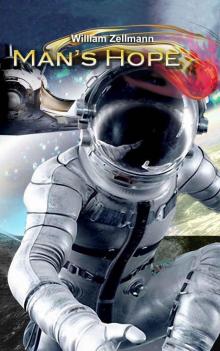- Home
- Zellmann, William
Exiled to the Stars
Exiled to the Stars Read online
Table of Contents
EXILED TO THE STARS
Author's note:
BOOK I – THE VOYAGE
Chapter 1
Chapter 2
Chapter 3
Chapter 4
Chapter 5
Chapter 6
Chapter 7
Chapter 8
Chapter 9
Chapter 10
Chapter 11
Chapter 12
BOOK II – THE COLONISTS
Chapter 13
Chapter 14
Chapter 15
Chapter 16
Chapter 17
Chapter 18
Chapter 19
Chapter 20
Chapter 21
Chapter 22
BOOK III: CITY
Chapter 23
Chapter 24
Chapter 25
Chapter 26
Chapter 27
Chapter 28
Chapter 29
If you enjoyed this book
About the Author …
EXILED TO THE STARS
By William Zellmann
~~~~~~
Text Copyright 2012 William Zellmann
All rights reserved
~~~~~~
~~~~~~
Author's note:
Units of measure are metric, and the terms are simply the type of contractions and changes that creep into language over time. Cems = centimeters, klicks = kilometers (this has already become common usage), etc.
Finally, the short story mentioned in chapter 28, "Omnilingual", by H. Beam Piper, is now public domain and available free from Gutenberg.org. Download it here
Enjoy!
~~~~~~
~~~~~~
BOOK I – THE VOYAGE
~~~~~~
Chapter 1
17 August 2203 AD
The crushing pressure of lift off pushed Ron Creding deep into the padding of the acceleration couch. But at least he expected it; panicked cries and screams told him that many of the passengers aboard the shuttle did not.
He turned his head with difficulty and verified that even the armed guards were now ensconced in acceleration couches and helpless. Of course, the knowledge was useless; there was no way he could struggle to his feet, much less escape his bonds and attack them.
The cries and screams subsided into grunts and groans as the crushing acceleration went on. Finally, though, and suddenly, the pressure lifted. The guards bounded from their couches, drifting in the weightlessness as their eyes scanned ceaselessly for threats.
When the acceleration ceased, the panicked voices silenced by the pressure once again rose, this time to an excited rumble. The rumble quickly subsided into strangled gasping as free-fall sickness reared its ugly head. The guards were frantically yelling at people to use their airsick bags. The few uniformed "flight attendants" maneuvered expertly in the weightlessness, capturing drifting globules of vomit in paper bags.
Ron sighed. He would have loved to unstrap and experiment with the lack of gravity. If the circumstances had been different, this would be the most exciting moment of his life. Since childhood, he had dreamed of space and longed to experience travel between the stars.
But on United Earth, space travel was limited to a very few scientific outposts on Mars and orbiting Venus. Except for the Colony Program, of course. But no sane person volunteered for the Colony Program.
The Colony Program was United Earth's last, desperate attempt at a solution to the problem of overcrowding. For over two centuries, United Earth had been trying to cope with the fact that population in the developed, educated countries was actually declining, while population in the so-called "third world," those nations crowded with poor, uneducated people struggling to survive, continued to explode. Early efforts had included education, free birth control advice and devices, and even legal limits on the size of families. But nothing had worked.
If you are a poor farmer, living in a hut with no amenities, struggling to raise enough food for one meal a day on a small plot of land, sex is nearly your only form of escape from your misery. Besides, male children can be expected to take care of you when you are old and no longer able to pursue the daily struggle. Of course, if a farm plot can barely feed two adults and a child or two, it will not be able to cope with one or more additional adults. So excess grown children moved to the already-crowded cities and struggled to raise enough to feed themselves and later their own wives and children.
Nothing EarthGov tried worked. The farmers knew how to grow rice. Or Maize. Or Cocoa Their fathers and grandfathers had taught them. Who were these city people with their soft hands to tell them their fathers were wrong? They give you livestock you can't afford to feed, so you either sell it or eat it. Oh, you might keep a few chickens, for eggs and meat, but who can afford to feed a cow? Education? You don't need to know how to read to plow a field. As for the birth control, if you didn't have male children, who would help with the farming, and care for you in your old age? And when the condoms ran out, did they really expect you to waste a whole day or even more walking to town to get more?
Laws limiting family size? You just took your chances. If you live klicks from the nearest road, there's very little chance of a law enforcement officer visiting; and if they do, why, you just hide the kids until they leave.
EarthGov grew more and more desperate. The average educational level was dropping sharply. Where were the engineers, the teachers, the techs needed to keep civilization running to come from? Civilization was being overrun by the uneducated poor.
Then, just as space research was sputtering to a standstill, Joshua Combs had discovered the hyperdrive. Suddenly, man could travel to the stars, and the universe opened to mankind.
At first, EarthGov was only mildly interested. But a senior bureaucrat was finally convinced to hear out a space scientist's proposal. Colonization!
The Colony Program was born.
At first, EarthGov took volunteers, and found many. Five expeditions were sent out before someone in EarthGov realized that the volunteers were not the people they needed to send. The volunteers were largely bright and well-educated. Oh, they were often troublemakers as well, but the point was that the people they needed to send were the uneducated poor, not the people upon whom society depended!
So, over time, the Colony Program evolved. Now, EarthGov administered mass intelligence tests worldwide. The highest-scorers were taken from their families and sent to the Space Academy. Since EarthGov paid the families of draftees a generous bonus, it had become an honor to be selected. At the Academy, the uneducated teens and adults were force-fed a rudimentary general education and intensive training in operating starships and the colony-building equipment they carried. They were selected for various specialties based upon their aptitudes. After two years, most of them were ready for their one-way trip.
For a select few, though, those at the very top of the classes, there was an additional two-year course. The ships and crews were slated for one-way trips, so seniority could not depend upon experience. The best, the brightest, and most stable were selected for Senior Officer Training. During those two additional years, they were ruthlessly screened and tested. They studied leadership as well as technical subjects, and eventually were assigned ranks and positions as Captains or senior Department Heads. By the time they completed the curriculum, they had all the academic preparation of Colonels in the EarthGov space forces. Of course, they completely lacked the on-the-job experience those ranks demanded. EarthGov was well aware of the impact of that lack, and that this was the best they would be able to do for the crews and the ships. So they trained them and prayed a lot.
Ships were being mass-produced in the orbital factorie
s at the L-4 and L5 Lagrange points, using mostly lunar and asteroid materials. As soon as they were completed, "recruitment" began. A crew was usually graduating the Academy as a ship was completed.
EarthGov had a routine for "recruitment" now. First, EarthGov departments nominated troublemakers and radical idealists causing them irritation. EarthGov-approved religious leaders nominated those "interfering" with the faithful. Law enforcement authorities and the courts sent their own supply of troublemakers, though they were expected to filter out murderers. Sometimes they did. These were the "Undesirables," or "Undies."
Usually, these provided only a fraction of the five thousand people required to fill a ship, so gangs of "recruiters" would stage raids on a few of the thousands of slums and "squatter camps" around the world, rounding up men, women, and children and dragging them off to a regional "Classification Center."
EarthGov law said that all personnel "recruited" had to be interviewed and evaluated, to ensure that they were "qualified" to become colonists. Of course, the vast majority were found to be "qualified." Oh, if a person had something of value to offer the interviewer, it might be decided that they were actually a "contributor" to society, and not just a "consumer." In that case, of course, they were escorted from the Recruiting Center and released, as were those with chronic illnesses or intelligence classed as "below normal." The rest, the "Drones," were given a one-week "training" indoctrination and sent up to their waiting ship. Every ship left with a full crew and a full cargo of "colonists."
Colony ships were specially designed, and each mission was carefully planned; EarthGov never stinted on those steps.
The ships were designed, equipped, and supplied to travel up to two hundred light-years. Their courses were carefully computed to traverse at least three systems containing "Earth-like" planets. Since "Earth-like" covered a multitude of conditions, for EarthGov purposes this usually meant that space telescopes had revealed that a system had at least one planet in the liquid-water zone. The liquid-water zone is the area of space surrounding a star in which water can "normally" exist as a liquid. Too close in, and the temperatures are too high for water to condense. Too far out and any water will be permanently locked into ice. EarthGov agreed that survival of a colony depended upon liquid water.
Sometimes, when a star was close enough, spectral analysis might indicate that a planet might have an oxygen/nitrogen atmosphere. But most often, EarthGov had to settle for the "liquid water" test.
Besides being equipped for a two-hundred-light-year trip, the ships were carefully designed to permit a single soft landing. Since the Combs Drive was little more than a barely-controlled antimatter bomb, the ships resembled half-kilometer-sized spheres mounted on shafts over a kilometer long, with the Combs hyperspace generators forming a wider tube at the end. The ships were built in space, but they were not equipped with shuttlecraft. When, or if, they found a suitable planet, the only way to get the ship's "colonists" down to it was to land the ship. The habitation sphere would disconnect from the tube that was EarthGov's only attempt to protect the colonists from a matter/antimatter explosion, and the sphere alone would descend to the planet. In theory, the Combs drive would become an orbiting power satellite, and would beam power to the new colony. Of course, no one knew how well theory translated into practice.
And it would now be a colony. Once down, the ship would never lift again. Her normal-space engines were small, permitting maneuver in space and a soft landing, but were insufficient to lift her against a gravity field.
Besides, the ships were huge, spheres half a klick in diameter, and the frames could not be made strong enough to support themselves in a one-gee field. Once landed, the ship's fabric would begin to settle and distort.
Colony ships were one-way ships, but that didn't mean they were death ships. The EarthGov leadership were not monsters. They told themselves that someday, once their population problem was solved, man would again venture forth from Earth and would find human colonies on many of the planets their ships were visiting. Or perhaps descendents of a colony ship would return to visit Earth!
The ships were crammed with everything EarthGov could think of that would facilitate the establishment of a successful colony. Each ship contained seeds for what EarthGov hoped was a stable Earthlike ecology, frozen fertilized ova of hundreds of animal and fish varieties, and even heavy building and farming equipment. They also carried a large and very advanced computer containing detailed educational resources, ranging from basic primers teaching the alphabet, reading, and basic English to degree-level courses on practically any subject.
Ron was cynic enough to be certain that there were colony ships drifting endlessly in space, carrying their dead thousands, and others rusting away on planets too inimical to support a colony. But he clung desperately to the hope that EarthGov was right; that somewhere out there, colonies were building and thriving. No one knew, of course. No one had ever returned.
There was a loud thunk as the shuttlecraft docked with the huge L-4 space station, the orbital factory at which many of the ships were built. The colonists stirred and a low growl of conversation broke out, but the armed guards paid no attention except to stop people who were starting to try to release their seat belts.
After ten minutes, the hatch opened, and a parade of uniformed "flight attendants," accompanied by another group of guards, entered and began releasing the seat belts. The belts were designed with locks; only the flight attendants had the necessary key.
"Stay seated," the head guard shouted. "Do not try to get up. We will stun you!"
A young man pushed himself out of his couch and drifted free; one of the guards fired his stunner, and the young man drifted unconscious above the other colonists. The guard grabbed a foot and pulled him back down into his couch.
"Goddammit!" the head guard yelled, "now do you believe me? Now we're gonna have to carry that fool to the meeting."
Finally all of the 200 passengers was released. The attendants had them get up by rows and guided them out of the shuttle's hatch under the watchful eyes of the guards. Few were able to make the move smoothly. In fact, movement triggered another round of space sickness in many of them. Many of the rest drifted helplessly, flailing in the zero gee. Ron was faintly proud that he didn't get space sick. He watched the movements of the attendants and the guards, and tried to mimic their techniques when his turn came. He was only partially successful, but judging by the busy attendants and guards, he did better than most.
They swam, drifted, and were pulled down a featureless corridor to a large auditorium. Similar streams of colonists were drifting through a dozen more doorways. An attendant grabbed his foot and pulled him into a seat, again buckling a seat belt, but not locking it this time. Ron shook his head. Seats were rather a waste in the weightlessness of space. One could simply assume a sitting position in mid-air and float. He assumed the seats were more for crowd control than comfort.
Ron chuckled sourly at the seat belts. Where would I go? Talk about a perfect prison; there's vacuum all around, and the only way off is their shuttle!
The hubbub and roar of conversation got louder as more and more colonists were brought in. The large man on his right leaned over. "Sprechen sie Deutsch?"
Actually, Ron understood that the man was asking if he spoke German; but that was about his limit in that language. He smiled and shook his head, but he made a mental note to think about learning German once they were underway, since it seemed the Drones had been rounded up in Germany, or at least a German-speaking region.
The man rolled his eyes. "Naturlich," he muttered and turned away. Ron shrugged.
The auditorium was almost full by now, but there was little confusion, thanks to the attendants and, of course, the guards. Many of the colonists were still space-sick, and the attendants were kept busy collecting and replacing space sickness bags. Looking around, Ron began to reconsider his note to learn German. Those brought aboard from his shuttle were a rainbow mix of colors; but in
this much larger crowd, it became apparent that the vast majority were Asian. They seemed to be overwhelmingly light brown in color, black haired, and their eyes displayed a distinct epicanthic fold. Filipino, maybe, or Malaysian.
Suddenly, Ron felt conspicuous in his white skin. He took comfort from the fact that the German man to his right shared his complexion shade, though the man on his left was a chocolate brown.
Uniformed "flight attendants" drifted by overhead, passing an envelope to each "colonist." The envelope contained a hand-sized card and a pair of featureless beads Ron recognized as identical to the earbud music players in the small bag of personal belongings he had been permitted to bring. He inserted the beads into his ears as a cartoon on the card indicated, and felt them reshape to match the contours of his ear canals. He would have thought them broken except that the man to his right picked that moment to exclaim, "Mein Gott!" Ron dimly heard the exclamation around the earbuds, but through the buds he heard, "My God!" Obviously, they were translators.
Ron turned to the slight, bespectacled middle-aged man to his left. As always, the eyeglasses irritated Ron. Vision correction was a simple procedure these days, requiring only a few minutes of minor laser surgery and a few days of recovery. But the administrators of the EarthGov's Universal Healthcare Program had decided that this particular procedure should not be funded. Eyeglasses, they reasoned, worked acceptably well, and provided employment for thousands worldwide in the manufacture of frames and lenses, as well as Opthalmologists to write the prescriptions, and Optometrists to deliver and fit the glasses.
So what if it took over a month to get an appointment for an eye exam, two months to get the prescription approved and the frames and lenses ordered, and another six months to get them to the patient? "The greatest good for the greatest number" was the mantra of EarthGov. So what if all those jobs meant several million people had to go through nine months of blurry or difficult vision and possible loss of their own job? It was only a minor, temporary individual sacrifice, after all.

 The Privateer
The Privateer Man's Hope
Man's Hope The Rim Rebels
The Rim Rebels The Privateer 2: AN HONEST LIVING
The Privateer 2: AN HONEST LIVING Exiled to the Stars
Exiled to the Stars